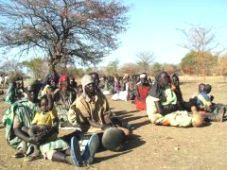US struggles to muster support for Sudan’s Darfur
April 17, 2006 (WASHINGTON) — Nineteen months after branding the carnage in Sudan’s Darfur region as genocide, the United States is struggling to muster support to end one of the world’s worst humanitarian crises.
 Facing Sudanese resistance to foreign peacekeepers, delays from the African Union (AU) and United Nations, and a wariness from NATO to commit too much more of its own resources, US officials are showing signs of impatience.
Facing Sudanese resistance to foreign peacekeepers, delays from the African Union (AU) and United Nations, and a wariness from NATO to commit too much more of its own resources, US officials are showing signs of impatience.
Washington has been pushing to end the three-year-old conflict between Darfur rebels and government backed-militia that has left up to 300,000 people dead from violence and disease and two million homeless.
Still haunted by the world’s failure to stop the 1994 genocide in Rwanda, officials insist plans to boost an African Union peacekeeping force in Darfur and nail down a peace agreement are moving ahead.
“Would we have liked to have seen things move more quickly? Yes,” State Department spokesman Sean McCormack said Friday. “It might not move as quickly as we would like, but it is moving forward.”
Some Africa watchers say the United States needs to work harder to mobilize international action against the Sudanese regime to curb the bloodshed in its western region which has spilled over into neighboring Chad.
But significant obstacles remain, they say. For one, no major power has followed the US declaration of genocide in Darfur made by then-secretary of state Colin Powell in September 2004.
Tough UN measures have run into opposition from China, which has considerable oil interests in Sudan. Khartoum has also been playing the pan-African card to block the deployment of foreign troops in Darfur.
Within the United States, there is concern about rupturing relations with Sudan’s government, which is now considered a partner in the war on terror even if it is still listed here as a state sponsor of terrorism.
“With Rwanda 10 years ago, nobody had any interest so nobody did anything,” said Leslie Lefkow, a Darfur expert with Human Rights Watch. “With Sudan everybody’s got interests and they’re all different so nobody does anything.”
The US dilemma on Darfur was highlighted last Thursday when Secretary of State Condoleezza Rice called for an urgent international response to the Darfur crisis, insisting “we really can’t afford to wait.”
The same day her deputy Robert Zoellick, appearing at a Brookings Institution forum on Sudan, gave a candid assessment of the delicacy of dealing with the regime of President Omar el-Bashir.
The United States is backing efforts to transfer the 7,000-strong AU contingent in Darfur into a more-robust UN force. But Zoellick suggested there was little way to ram foreign peacekeepers down Khartoum’s throat.
“You either get the approval of the government, as the government did for the African Union force and the NATO support, or you invade, and that’s a very big, serious challenge,” he said.
Zoellick said the United States was counting on Khartoum’s cooperation, not only in Darfur but in efforts to implement a January 2005 peace agreement that ended a 21-year war with rebels in the country’s south.
“And so that is the challenge of working with regimes that we don’t like, how do you get that combination moving forward and how do you try to put pressure on them to take the right steps?”
The United States spent its month-long presidency of the UN Security Council in February in an unsuccessful effort to win approval for a resolution on a new peacekeeping force for Darfur.
The world body was to have sent a team to Darfur to assess the needs of such a force but has been bogged down in a wrangle with the Sudanese over visas.
US officials have taken no pains to hide their frustration. Asked about the delay last week, Zoellick responded dryly, “As you may have noticed, we don’t always run the UN.”
Even among US allies, there are indications that some are not completely on the same page as the Americans.
When NATO Secretary General Jaap de Hoop Scheffer visited Washington last month, President George W. Bush expresed hope the alliance would “take the lead” in Darfur.
But Scheffer made it clear he saw NATO, which currently provides air transport for AU soldiers, as playing more of a logistical and training support role without troops on the ground.
The United States, which has already slapped an economic embargo and other sanctions on Sudan for sponsoring terrorism, last week pushed for UN moves to target individuals responsible for the slaughter in Darfur.
But Lefkow, the Human Rights Watch expert, worried only low-level Sudanese would be affected by assets freeze and travel restrictions. She said the measures would have no bite unless they “start hitting harder and hitting higher.”
(ST/AFP)
